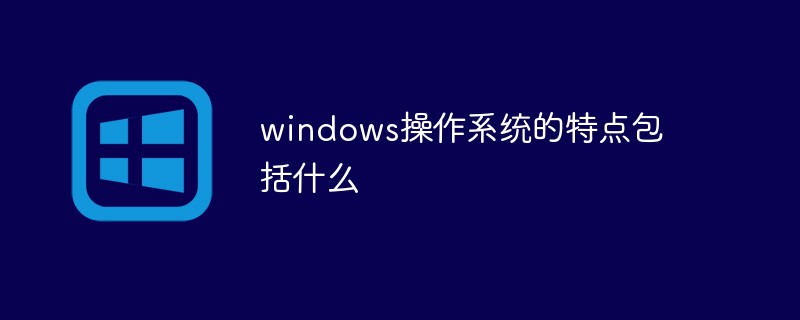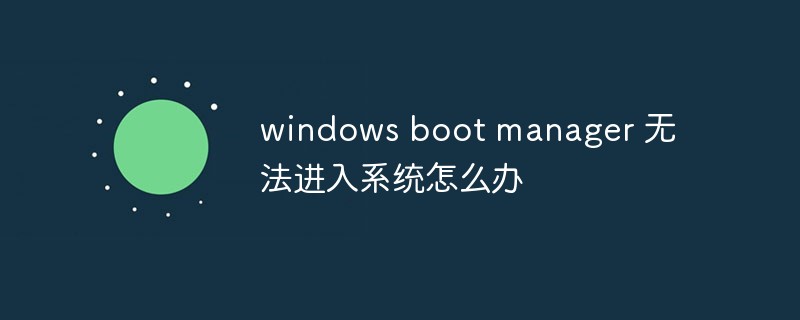The five major management functions of the operating system are process management, file management, memory management, device management and user interface. Detailed introduction: 1. A process is an instance of a running program. The process management function is responsible for controlling and coordinating resource allocation and scheduling between different processes, including process creation, termination, suspension, recovery and switching operations; 2. File The management function is responsible for managing the storage, organization and access of files, including file creation, opening, closing, reading, writing and deletion operations; 3. The memory management function is responsible for allocating the computer's memory space, etc.

# Operating system for this tutorial: Windows 10 system, Dell G3 computer.
The operating system is one of the most important software in a computer system. It is responsible for managing computer hardware resources and providing a reliable and efficient execution environment for applications. The operating system achieves this goal through five major management functions, including process management, file management, memory management, device management and user interface. Each feature is described in detail below.
Process management:
A process refers to an instance of a running program. The process management function is responsible for controlling and coordinating resource allocation and scheduling between different processes. It includes operations such as process creation, termination, suspension, recovery and switching. Through process management, the operating system can effectively utilize processor resources and improve system concurrency and throughput.
File management:
The file management function is responsible for managing the storage, organization and access of files. It includes operations such as file creation, opening, closing, reading, writing, and deletion. The operating system provides a unified interface through file management, allowing applications to easily access files stored on different devices, while also enabling file sharing and protection.
Memory management:
The memory management function is responsible for allocating and recycling the computer's memory space. It includes operations such as memory partitioning, allocation, recycling and protection. Through memory management, the operating system allows applications to run in the virtual address space, achieving isolation and protection between processes. It can also provide functions such as virtual memory and page replacement, expanding the available memory space.
Device management:
The device management function is responsible for managing and controlling the computer's external devices. It includes operations such as device allocation, scheduling, interrupt handling, and driver management. Through device management, the operating system allows applications to easily use various external devices, such as printers, hard disks, keyboards, etc., and provides a unified interface to access these devices.
User interface:
The user interface is the interactive interface between the operating system and the user. It can be a command line interface, a graphical user interface, or some other form of interface. The user interface function is responsible for receiving input from the user and displaying output from the operating system. The operating system allows users to easily interact with the computer and perform various operations through the user interface, such as starting programs, managing files, and setting system parameters.
In summary, the five major management functions of the operating system are process management, file management, memory management, device management and user interface. Together they form the core functions of the operating system, responsible for managing various resources in the computer system and providing a reliable, efficient and friendly execution environment for applications.
The above is the detailed content of What are the five major management functions of the operating system?. For more information, please follow other related articles on the PHP Chinese website!
 世界上的三大操作系统是什么Aug 22, 2022 pm 04:24 PM
世界上的三大操作系统是什么Aug 22, 2022 pm 04:24 PM三大操作系统:1、windows,是微软公司以图形用户界面为基础研发的操作系统,主要运用于计算机、智能手机等设备。2、macOS,是一套由苹果开发的运行于Macintosh系列电脑上的操作系统,是基于XNU混合内核的图形化操作系统。3、linux,是一种免费使用和自由传播的类UNIX操作系统,是一个基于POSIX的多用户、多任务、支持多线程和多CPU的操作系统。
 vivo手机是什么系统Jul 04, 2022 am 11:10 AM
vivo手机是什么系统Jul 04, 2022 am 11:10 AMvivo手机是“Funtouch OS”和“OriginOS”系统;2020年11月18日之前,vivo手机搭载的都是“Funtouch OS”系统,2020年11月18日“OriginOS”操作系统发布之后,vivo手机搭载的就是“OriginOS”操作系统了,首款搭载该系统的是“vivo X60”系列手机。
 windows操作系统的特点包括什么Sep 28, 2020 pm 12:02 PM
windows操作系统的特点包括什么Sep 28, 2020 pm 12:02 PMwindows操作系统的特点包括:1、图形界面;直观高效的面向对象的图形用户界面,易学易用。2、多任务;允许用户同时运行多个应用程序,或在一个程序中同时做几件事情。3、即插即用。4、出色的多媒体功能。5、对内存的自动化管理。
 什么是闭环控制系统Jul 04, 2022 pm 04:18 PM
什么是闭环控制系统Jul 04, 2022 pm 04:18 PM闭环控制系统是控制系统的一种类型,能够把系统输出量的一部分或全部通过一定方法和装置反送回系统的输出端,再将反馈信息与原输入信息进行比较,将比较的结果施加于系统进行控制,避免系统偏离预定目标。
 什么是操作系统?它的作用是什么?Dec 07, 2020 pm 03:04 PM
什么是操作系统?它的作用是什么?Dec 07, 2020 pm 03:04 PM操作系统是管理计算机硬件与软件资源的计算机程序,是控制和管理计算机软硬件资源,以尽量合理有效的方法组织多个用户共享多种资源的程序集合。操作系统的作用:1、管理系统中的各种资源;2、为用户提供良好的界面。从计算机用户的角度来说,操作系统体现为其提供的各项服务;从程序员的角度来说,其主要是指用户登录的界面或者接口;从设计人员的角度来说,就是指各式各样模块和单元之间的联系。
 系统软件中最重要的软件是什么?Dec 10, 2020 pm 04:56 PM
系统软件中最重要的软件是什么?Dec 10, 2020 pm 04:56 PM系统软件中最重要的软件是“操作系统”。在计算机中,操作系统是其最基本也是最为重要的基础性系统软件;操作系统需要处理如管理与配置内存、决定系统资源供需的优先次序、控制输入设备与输出设备、操作网络与管理文件系统等基本事务。
 电脑开机快慢和什么有关Aug 12, 2022 am 10:47 AM
电脑开机快慢和什么有关Aug 12, 2022 am 10:47 AM影响电脑开机快慢的因素:1、操作系统;如果操作系统太过庞大,开机要加载的文件、服务、软件过多就会让开机速度变慢。2、硬件;硬件对于开机的影响主要是CPU、内存容量和硬盘速度,主板中预存的引导程序会引导CPU通过主板从硬盘中调用启动系统的数据,然后在内存空间内运行,因而CPU、内存大小和硬盘直接影响电脑开机的速度。3、加载项;加载项越多,硬盘要加载的东西就越多,开机速度就越慢。
 windows boot manager 无法进入系统怎么办Nov 13, 2022 pm 02:06 PM
windows boot manager 无法进入系统怎么办Nov 13, 2022 pm 02:06 PMwindows boot manager无法进入系统的解决办法:1、开机按DEL键;2、进BIOS设置光盘或U盘引导电脑进WinPE;3、使用Diskgenius重建主引导记录,并重启电脑;4、重装操作系统。

Hot AI Tools

Undresser.AI Undress
AI-powered app for creating realistic nude photos

AI Clothes Remover
Online AI tool for removing clothes from photos.

Undress AI Tool
Undress images for free

Clothoff.io
AI clothes remover

AI Hentai Generator
Generate AI Hentai for free.

Hot Article

Hot Tools

SublimeText3 Chinese version
Chinese version, very easy to use

SublimeText3 English version
Recommended: Win version, supports code prompts!

MantisBT
Mantis is an easy-to-deploy web-based defect tracking tool designed to aid in product defect tracking. It requires PHP, MySQL and a web server. Check out our demo and hosting services.

Dreamweaver CS6
Visual web development tools

WebStorm Mac version
Useful JavaScript development tools





